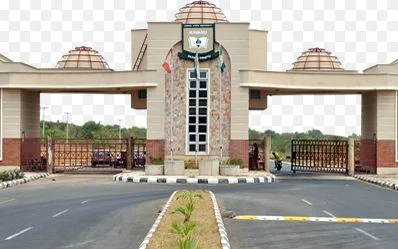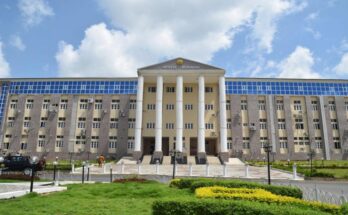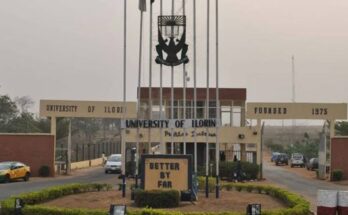KWASU School Fees: Kwara State University, popularly known as KWASU, is one of Nigeria’s most prestigious universities.
Established in 2009, the institution is renowned for its academic excellence, state-of-the-art facilities, and commitment to providing accessible education to students from diverse backgrounds.
One of the most frequently asked questions by prospective students and parents is: “What are KWASU’s school fees per semester?”
In this article, we will provide a comprehensive breakdown of KWASU’s school fee structure for all courses, distinguishing between indigenous and non-indigenous students.
Whether you are a returning student, a new entrant, or a parent planning for your child’s education, this guide will help you understand the cost implications of studying at KWASU.
KWASU School Fees
Kwara State University operates a transparent school fee system. The tuition fees are categorised based on whether a student is an indigene (from Kwara State) or a non-indigene (from other Nigerian states or international students).
This differentiation reflects the university’s support for its host community while maintaining inclusivity for students from other regions.
The fees are also determined by the course of study, with some programs attracting higher fees due to their specialised nature or resource-intensive requirements.
KWASU School Fees for Indigenous Students
For students who are indigenes of Kwara State, the school fees are relatively affordable.
This subsidy is part of the state government’s commitment to making education accessible to its residents.
- Faculty of Humanities, Management, and Social Sciences
- Tuition Fees: ₦99,500 per semester
- Additional Charges: ₦5,000 for departmental dues, ICT fees, and other levies.
- Faculty of Science and Engineering
- Tuition Fees: ₦109,500 per semester
- Additional Charges:₦7,000 for laboratory fees, ICT fees, and other levies.
- Faculty of Agriculture
- Tuition Fees: ₦104,500 per semester
- Additional charges: ₦6,500 for practical sessions, ICT fees, and departmental dues.
- Faculty of Education
- Tuition Fees: ₦85,500 per semester
- Additional Charges:₦4,000 for library access and other levies.
Payment Options for Indigenous
KWASU allows indigenous students to pay their fees in installments. This flexibility ensures that students from low-income families can conveniently manage their tuition costs.
KWASU School Fees for Non-Indigene Students
Non-indigene students pay higher fees compared to indigenes. This policy is common in many state-owned universities in Nigeria and reflects the additional cost of providing education to students from outside the state.
- Faculty of Humanities, Management, and Social Sciences
- Tuition Fees: ₦199,500 per semester
- Additional Charges: ₦5,000 for departmental levies, ICT fees, and other charges.
- Faculty of Science and Engineering
- Tuition Fees: ₦209,500 per semester
- Additional Charges:₦7,000 for laboratory fees, ICT fees, and other levies.
- Faculty of Agriculture
- Tuition Fees: ₦204,500 per semester
- Additional Charges: ₦6,500 for practicals and departmental fees.
- Faculty of Education
- Tuition Fees: ₦185,500 per semester
- Additional Charges:₦4,000 for library and ICT charges.
International Students
For international students, the fees are slightly higher, starting from ₦300,000 per semester, depending on the course of study.
KWASU School Fees by Course
| Course | Indigene Fees (₦) | Non-Indigene Fees (₦) |
|---|---|---|
| Accounting | 99,500 | 199,500 |
| Business Administration | 99,500 | 199,500 |
| Mass Communication | 99,500 | 199,500 |
| Computer Science | 109,500 | 209,500 |
| Civil Engineering | 109,500 | 209,500 |
| Agricultural Science | 104,500 | 204,500 |
| Educational Management | 85,500 | 185,500 |
Other Fees and Charges
In addition to the tuition fees, KWASU students are required to pay some ancillary fees.
These fees cover essential services like ICT, library access, and departmental dues. Below is a quick overview:
- ICT Fees: $2,000 per semester
- Library Fees: ₦1,500 per semester
- Laboratory/Practical Fees (for Science Students): ₦5,000 per semester
- Departmental Dues: ₦1,000 to ₦2,000 per semester (varies by course)
Payment Procedures
KWASU has simplified its fee payment process to ensure convenience for students. Below is a step-by-step guide:
- Log in to the KWASU Student Portal
Visit the official KWASU website and log in using your student credentials. - Generate Payment Invoice
Navigate to the “Fees Payment” section and generate a payment invoice. - Make Payment
Pay the fees online using a debit card or at any designated bank. - Confirm Payment
After payment, upload your receipt to the portal to confirm your transaction.
Scholarship Opportunities
KWASU offers various scholarship programs to support students, especially indigenous students. These scholarships are merit-based or need-based, and they can significantly reduce the financial burden on students.
Frequently Asked Questions (FAQs)
1. Is KWASU’s school fee refundable?
No, KWASU’s school fees are non-refundable once payment is made.
2. Can I pay KWASU’s school fees in installments?
Yes, KWASU provides an option for students to pay their fees in two installments per semester.
3. Are there penalties for late payment?
Yes, late payment attracts a penalty fee of ₦10,000.
4. Do international students pay the same fees as non-indigene students?
No, international students pay slightly higher fees, starting from ₦300,000 per semester.
How much is the KWASU acceptance fee?
The KWASU (Kwara State University) acceptance fee is ₦35,000 for newly admitted students. This fee is a mandatory payment that confirms your admission into the university. Ensure you pay this fee promptly to secure your admission.
Is KWASU a private university?
No, KWASU is not a private university. It is a state-owned institution established by the government of Kwara State in 2009. It is known for its academic excellence and operates as a public university.
How much are KWASU top-up school fees?
The KWASU top-up (or part-time degree) school fees range from₦120,000 to₦150,000 per session, depending on the program. The Top-Up and Conversion Program is designed for individuals looking to convert their HND or previous qualifications into a degree.
How much is the KWASU form fee?
The KWASU form fee, also known as the application fee for admission, is ₦2,000 for JAMB candidates applying for undergraduate programs. However, for other programs like top-up or postgraduate studies, the fee might vary, so ensure you confirm the specific amount for your chosen program.
What rank is KWASU in Nigeria?
As of recent rankings, KWASU is among the top 50 universities in Nigeria. Though its specific position may vary depending on the ranking body, KWASU is widely recognised for its focus on entrepreneurship and research.
Does KWASU do screening or post-UTME?
KWASU conducts a screening process and does not typically administer a post-UTME examination. Candidates are evaluated based on their JAMB scores, O’level results, and other admission criteria during the screening exercise.
How do I gain admission into KWASU?
To gain admission into KWASU, follow these steps:
- Choose KWASU as your first choice in your JAMB registration.
- Ensure you meet the minimum JAMB cut-off mark (usually 160 or higher, depending on the course).
- Participate in KWASU’s online screening exercise by submitting your O’level results and other required documents.
- Achieve good grades in your O’level exams (minimum of five credits, including mathematics and English).
- For direct entry, ensure you have the required qualifications, such as an ND, NCE, or HND.
- Pay the acceptance fee and complete your registration if offered admission.
Conclusion
KWASU’s school fee structure is designed to provide quality education at an affordable rate, especially for indigenes of Kwara State.
With flexible payment options, scholarships, and a clear breakdown of charges, students and parents can plan effectively.
Whether you are an indigene or a non-indigene, KWASU remains an excellent choice for higher education in Nigeria.



